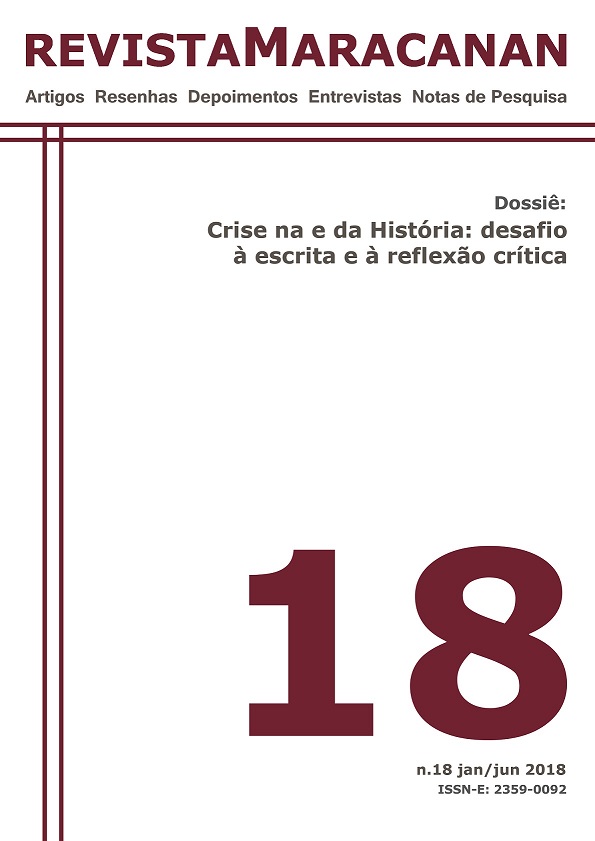Temporality and crisis: on one (im)possibility of future and politic in Brazil and in the contemporary world
DOI:
https://doi.org/10.12957/revmar.2018.31309Keywords:
Temporality, Crisis, Broad Present, Optimism, PessimismAbstract
This article discusses some aspects of the contemporary crisis based on its relationship with temporality. We argue that a certain difficulty in the emergence of intellectual and political proposals for its confrontation can be attributed, among other factors, to a form of experimentation of the future, which is not fully determined by the expectation of perfection, perfectibility and progress. It also discusses the sensation of a possible imprisonment in the crisis in view of a certain form of its confrontation from the media and social networks. In the end, we approach perspectives that seek to go beyond the categories of pessimism and optimism. The insistence on the classification of intellectual diagnoses or political actions from them establishes a dependence on an expectation of the ideal future.References
ARENDT, Hannah. A condição humana. Rio de Janeiro: Forense Universitária, 2014.
ARENDT, Hannah. Origens do totalitarismo. Anti-semitismo, imperialismo, totalitarismo. São Paulo: Companhia das letras, 1990.
BALDWIN, James. I am not your negro. New York: Vintage International, 2017.
FOUCAULT, Michel. As Palavras e as Coisas. Uma arqueologia das ciências humanas. São Paulo: Martins Fontes, 2000.
GUMBRECHT, Hans Ulrich. Modernização dos Sentidos. São Paulo: Editora 34, 1998.
GUMBRECHT, Hans Ulrich. Nosso amplo presente: o tempo e a cultura contemporânea. São Paulo: Ed. Unesp, 2015.
KOSELLECK, Reinhart. A temporalização da utopia. In: Estrados de tempo. Estudos sobre a história. Rio de Janeiro: Contraponto; PUC-Rio, 2014.
KOSELLECK, Reinhart. Futuro Passado: contribuição à semântica dos tempos históricos. Rio de Janeiro: Contraponto; Puc-Rio, 2006.
KOSELLECK, Reinhart. Is There an Acceleration of History? In: ROSA, Hartmut; SCHEUERMAN, William E. (ed.). High-speed society: social acceleration, power, and modernity. State College: Penn State University Press, 2009.
KOSELLECK, Reinhart. Sobre la historia conceptual de la utopía temporal. In: Historias de conceptos: estudios sobre semántica y pragmática del lenguaje político y social. Madrid: Editorial Trotta, 2012.
MBEMBE, Achille. A era do humanismo está terminando. Revista do Instituto Humanitas – Unisinos. Publicado em: 24 jan. 2017. Disponível em: http://www.ihu.unisinos.br/78-noticias/564255-achille-mbembe-a-era-do-humanismo-esta-terminando. Acesso em: 20 out. 2017.
ORTELLADO, Pablo. Onde está a imaginação política da esquerda? Folha de São Paulo, São Paulo, 05 set. 2017. Disponível em: http://www1.folha.uol.com.br/colunas/pablo-ortellado/2017/09/1915919-onde-esta-a-imaginacao-politica-da-esquerda.shtml. Acesso em: 20 out. 2017.
RANGEL, Marcelo de Mello. Melancolia e história em Walter Benjamin. Ensaios Filosóficos, Rio de Janeiro v. XIV, p. 126-137, dez. 2016.
ROWAN, Rory. Extinction as usual?: Geo-social futures and left optimism. E-Flux Journal (online). Publicado em: 2015. Disponível em: http://supercommunity.e-flux.com/texts/extinction-as-usual-geo-social-futures-and-left-optimism/. Acesso em: 20 out. 2017.
Downloads
Published
How to Cite
Issue
Section
License
The copyrights of originals and translations published are automatically assigned to Revista Maracanan. The information contained in this papers are the sole responsibility of the authors.
The Copyright of the published articles belong to Revista Maracanan, with works simultaneously licensed under a Creative Commons Attribution-NonCommercial-ShareAlike 4.0 International License, which allows the sharing of work with mandatory recognition of authorship and initial publication in this journal, under the same license and for non-commercial purposes.

The Revista Maracanan is licensed with a Creative Commons Attribution-NonCommercial-ShareAlike 4.0 Internacional License.





